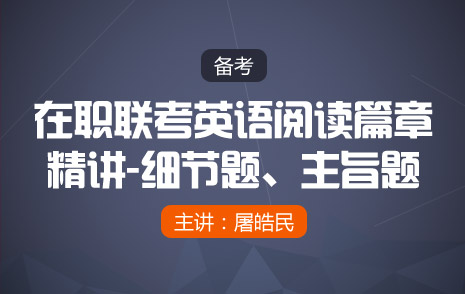2014-08-14 08:19:00 来源:网络发表评论
 在职联考准考证打印
在职联考准考证打印
备考辅导:英语备考策略和技巧 联考英语翻译备考策略 2015在职硕士考试经验技巧
GCT考试: GCT英语备考辅导 GCT数学备考辅导 GCT语文备考辅导 GCT逻辑备考
公共管理: 公文写作范文汇总 2015年在职MPA管理学案例材料 人力资源营销新论
艺术硕士: 艺术硕士艺术概论资料汇总 艺术硕士复习试题|答案 艺术硕士备考知识点
As you read this, nearly 80,000 Americans are waiting for a new heart, kidney or some other organ that could save their life. Tragically, about 6,000 of them will die this year--nearly twice as many people as perished in the Sept. 11 attacks--because they won't get their transplant in time. The vast majority of Americans (86%, according to one poll) say they support organ donation. But only 20% actually sign up to do it. Why the shortfall?
Part of the problem is the way we handle organ donations. Americans who want to make this sort of gift have to opt in--that is, indicate on a driver's license that when they die, they want their organs to be made available. Many European and Asian countries take the opposite approach; in Singapore, for example, all residents receive a letter when they come of age informing them that their organs may be harvested unless they explicitly object. In Belgium, which adopted a similar presumed-consent system 12 years ago, less than 2% of the population has decided to opt out.
Further complicating the situation in the U.S. is the fact that whatever decision you make can be overruled by your family. The final say is left to your surviving relatives, who must make up their minds in the critical hours after brain death has been declared. There are as many as 50 body parts, from your skin to your corneas, that can save or transform the life of a potential recipient, but for many families lost in grief, the idea of dismembering a loved one is more than they can bear.
The U.S., like all medically advanced societies, has struggled to find a way to balance an individual's rightful sovereignty over his or her body with society's need to save its members from avoidable deaths. Given America's tradition of rugged individualism and native distrust of Big Brotherly interference, it's not surprising that voters resisted attempts to switch to a presumed-consent system when it was proposed in California, Oregon, Minnesota, Pennsylvania and Maryland. Health Secretary Tommy Thompson last spring announced plans for a new initiative to encourage donations--including clearer consent forms--but its impact is expected to be modest. Given the crying need for organs, perhaps it's time we considered shifting to something closer to the presumed-consent model.
Meanwhile, if you want to ensure that your organs are donated when you die, you should say so in a living will or fill out a Uniform Donor Card (available from the American Medical Association). Make sure your closest relatives know about it. And if you don't want to donate an organ, you should make your wishes equally explicit.
1.According to the author, one of the reasons for a shortage of organs in America is ______.
[A] most Americans are reluctant to donate their organs after death
[B] the information about organ donation is not popular in America
[C] the ways to handle organ donation is far from perfect
[D] people waiting for transplant are rapidly increasing in America
2.What is most Americans’ attitude towards the organ donation?
[A] Indifferent.
[B] Indignant.
[C] Detached.
[D] Supportive.
3.It can be inferred from paragraph 4 that ______.
[A] Americans have a long tradition of weak individualism
[B] all the states in America resist the presumed-consent system
[C] it’s not easy to find a way to serve the society’s need and at the same time to protect the individual’s right in the matter of organ donation
[D] the government is not active in solving the problem
4.The term “presumed-consent” probably means ______.
[A] one’s organs should be donated whether they agree or not
[B] one is supposed to agree that their organ will be donated after death unless they explicitly object
[C] dismembering a dead body is inhuman
[D] one is assumed to be happy after they decide to donate their organs
5.From the text, we can see the author’s attitude towards organ donation is ______.
[A] supportive
[B] indignant
[C] indifferent
[D] negative
答案:CDCBA
 已帮助8878人
已帮助8878人
| GCT | 【特训】2015年GCT英语全程专项特训班 | ¥980 | 免费试听 |
| 【特训】2015GCT语文全程专项特训班 | ¥400 | 免费试听 | |
| 【特训】2015年GCT数学全程专项特训班 | ¥680 | 免费试听 | |
| 【特训】2015年GCT逻辑全程专项特训班 | ¥400 | 免费试听 | |
| 联考英语 | 【提高】2015年联考英语技巧提高班 | ¥680 | 免费试听 |
| 【冲刺】2015年联考英语冲刺抢分班 | ¥680 | 免费试听 | |
| 法律硕士 | 【全程】2015法律硕士专业综合全程 | ¥880 | 免费试听 |
| 工商管理 | 写作专项零基础班数学专项逻辑专项 | ||
| 专项班 | 公共管理会计硕士教育硕士艺术硕士 | ||
版权及免责声明
1,"新东方在线"上的内容,包括文章、资料、资讯等, 本网注明"稿件来源:新东方在线"的,其版权 均为"新东方在线"或北京新东方迅程网络科技有限公司所有 ,任何公司、媒体、网站或个人未经授权不得转载、链接、转贴或以其他方式使用。已经得到 "新东方在线"许可 的媒体、网站,在使用时必须注明"稿件来源:新东方",违者本网站将依法追究责任。
2, "新东方在线" 未注明"稿件来源:新东方"的 文章、资料、资讯等 均为转载稿,本网站转载出于传递更多信息之目的,并不意味着赞同其观点或证实其内容的真实性。如其他媒体、网站或个人从本网站下载使用,必须保留本网站注明的"稿件来源",并自负版权等法律责任。如擅自篡改为 " 稿件来源:新东方 " ,本网站将依法追究其法律责任。
3,如本网转载稿涉及版权等问题,请作者见稿后在两周内与新东方在线联系。

 w
12分56秒
w
12分56秒